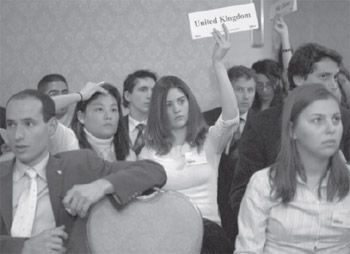|
||
     |
College Report
Model U.N. superpower
October 6, 1973, 3 a.m. Military and political leaders gather around an oval table in Egypt’s war room. They’re about to chart an attack against Israel, coordinating the offensive with Syrian forces. “What objectives do we set?” the cabinet’s leader asks. “Do we want to just get the Sinai back? Or do we want to go all the way into Israel?”

Second-year Koh Kim (left) and first-year Heather Dugan
represent the United Kingdom on a Model U.N. committee
debating international labor laws.
Egypt’s minister of war swivels in his chair as the discussion begins, waiting for the right moment to tear into other cabinet members’ broad calls for Israel’s destruction—and to introduce his own policy agenda. “It would be unfair to talk in rhetorical terms about driving the Jews into the sea,” he declares. “We need to look at the real limitations, work with the real military we have, and go from there.”
Welcome to Egypt’s Joint Cabinet Crisis, part of the Yom Kippur War as reenacted at the Harvard National Model United Nations conference this February. The Model U.N. system is a collection of conferences, mostly in the United States but also abroad, where students and adults represent nations or diplomats in debating real-world issues for a day or a weekend. This time the role of Egyptian minister of war Ahmad Ismail Ali was played by Yasser Ghanchi, ’05, a member of the University’s Model U.N. team.
The Egyptian cabinet, which Ghanchi applied to be on, was one of 23 groups that convened at the Harvard conference, held at the posh Boston Park Plaza hotel. Unlike Egypt, the Chicago squad was a winner, earning overall best delegation and marking a triple-crown sweep of major tournaments, following wins at the University of Pennsylvania and Yale University last fall. Team president Will Segal, ’05, declared, “This clearly demonstrates that we’re the best team in the world, if not the galaxy.” (The statement updated his post–Penn victory exclamation to the Maroon, when he called Chicago “clearly the best team in the country, if not the world.”)
Segal spent the weekend in the conference room next to Ghanchi, serving as army chief of staff in Israel’s war room—a role that he researched before and during the competition. In revisiting the 1973 war, the Egyptian and Israeli committees largely kept to the historical account but also were dealt twists from the organizers and their own back-and-forth maneuvering. In the real war, for example, Segal’s character, David (Dado) Elazar, had to disobey orders to mobilize Israel’s entire reserves; in the simulation the cabinet authorized full mobilization.
Segal and Ghanchi’s historical expertise and leadership qualities earned them both best delegate awards in their respective committees. Most of the other Chicago delegates, meanwhile, represented the United Kingdom—an important country assigned to Chicago because of its large, 29-member team. On agencies such as the U.N. Commission on Human Rights and the Security Council, they competed to articulate the best ideas and jockeyed for position during the resolution-writing process. The goal for each delegate was to impress the judges, members of the Harvard team. (Harvard didn’t compete, nor does Chicago in the spring conference it hosts.)
Committees ranged from fewer than a dozen members, for those that required applications, to more than a hundred. Procedural rules and 30-second time limits, especially in the larger groups, often constrained significant discussion and forced a focus on minutia. Yet despite such limitations, students addressed pressing world issues, learned the game of diplomacy—and flirted with peers from around the world. With 2,000 delegates from 200 universities, the conference hosted teams from Europe, Australia, China, and Iraq.
Chicago delegates served on 21 committees, earning distinctions in 13. Besides Segal and Ghanchi, five other members won first-place finishes: Peter Bartoszek, ’06, in the World Health Organization; Ryan Naughton, ’08, and Danielle Zheng, ’08, in the Social, Humanitarian, and Cultural committee; and Ali Cirone, ’06, and John Lee, ’07, in the U.N. Development Programme.
After the Harvard hosts declared Chicago the overall winner during the concluding ceremony, the team huddled in the expansive ballroom. “Themistocles, Thucydides, the Peloponnesian War. X-squared, Y-squared, H2SO4,” they called out, voices echoing off the chandeliered ceiling and drawing the other delegations’ attention. “Who for? What for? Who we gonna yell for? Go Maroons!”
After the Maroon cheer Ghanchi, for whom this conference was the last before graduation, began to chant “Kant, Kant, Kant.” Afterward he said, “What a fairy-tale ending. What a great way to finish.”